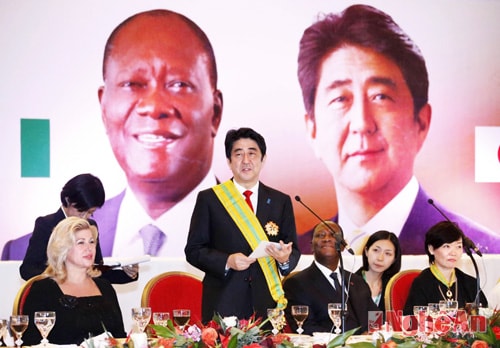Japan's new mark on the Black Continent
(Baonghean) - Japanese Prime Minister Shinzo Abe is on a tour of Africa to strengthen diplomatic and economic relations. Energy and commodity exports are considered the key issues in Prime Minister Abe's first trip of the year. However, public opinion is quite interested in the aid that Japan has pledged to give to this region. Hundreds of millions of US dollars and cooperation agreements are not only aimed at promoting stability in the Black Continent but also help Japanese companies create new "imprints" and not fall behind China in this potential region.
The purpose of Japanese Prime Minister Abe Shinzo's visit to Côte d'Ivoire, Mozambique and Ethiopia is explained by Tokyo as strengthening economic cooperation with these countries, thereby ensuring energy supplies and promoting goods exports. However, the deeper purpose lies in other aspects, which have much greater significance for Japan's diplomatic and economic position on the "black continent".
 |
| Japanese Prime Minister Shinzo Abe speaks at a meeting with Côte d'Ivoire's leaders in Abidjal on January 1. |
In the context of the economy of the Land of the Rising Sun is gradually recovering and regaining growth momentum, finding sources of energy and other natural resources is extremely necessary. And Africa is a fertile land that Japanese businesses are aiming for. Therefore, it is not surprising that accompanying Prime Minister Abe on this trip were more than 50 leading Japanese businesses. This shows that Japan has begun to see Africa as a potential economic partner rather than a region that only receives aid. Remember, at the international conference on African development last year in Tokyo, Prime Minister Abe pledged to provide 3,200 billion yen (equivalent to 32 billion USD) in aid to the "black continent" to develop infrastructure in the next 5 years. And in this visit, it seems that Prime Minister Abe has kept his promise!
In Côte d'Ivoire, Prime Minister Abe said that Japan will provide more than 80 million USD in aid for refugees in the Sahel region, a belt stretching from the Atlantic Ocean to the Red Sea. In addition, Tokyo also pledged 7.7 million USD in aid to Côte d'Ivoire to maintain domestic security. It is expected that Prime Minister Abe will also bring attractive investment commitments such as nearly 600 million USD in loans to Mozambique to build highways and about 100 million USD to Ethiopia to build a thermal power plant. From these important aid and cooperation agreements, Prime Minister Abe is looking to realize his determination to turn the potential African region into a promised land of growth in the near future. Once this becomes a reality, Japan's role and position here will not be small.
From another perspective, and also very noteworthy, Prime Minister Abe's visit to Africa took place at the same time as Chinese Foreign Minister Wang Yi visited four African countries. With this development, many analysts believe that Africa could very well be the new "battlefield" between Japan and China, as relations between the two countries have not yet ended tensions related to territorial disputes. Obviously, this will be a difficult "race" for influence for Japan because China has the advantage of being "first to arrive". Since 2009, China has become Africa's leading partner; 13.5% of the continent's foreign trade is with China, while with Japan it is only 2.7%, according to data from the Organization for Economic Cooperation and Development OECD. However, according to many experts, Japan is taking slow but steady steps, not investing in widespread exploitation of resources but selectively investing in specific projects, mainly infrastructure, which is Japan's strength. Thus, this visit of Prime Minister Abe will be a new beginning in regaining Japan's position in the Black Continent.
Thanh Huyen
